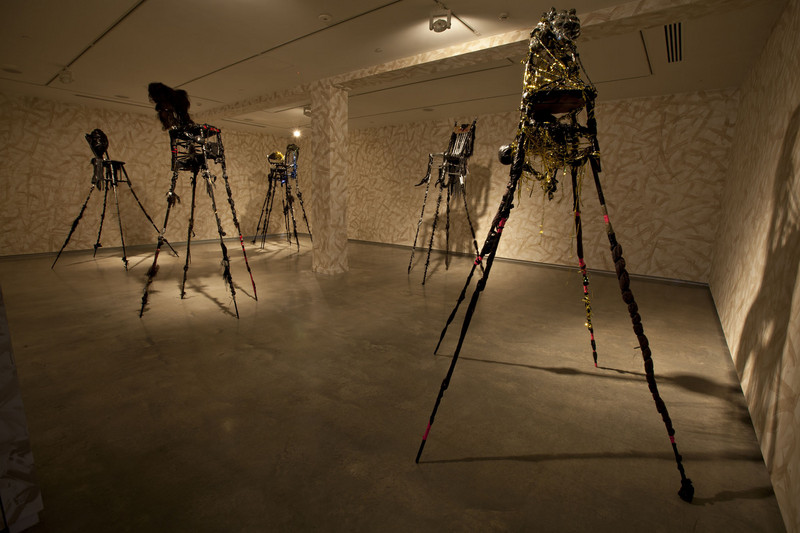Wangechi Mutu
23 May - 11 Aug 2013
WANGECHI MUTU
23 May - 11 Aug 2013
Curator: Rachel Kent
Wangechi Mutu is known for her artworks in which she mixes media and appropriates imagery from diverse popular sources. Born in Nairobi, Kenya in 1972 and based in New York, Mutu draws on her experience as an African woman and migrant, creating sumptuous, layered works that explore ‘otherness’ and themes of alienation, race and female representation. Spanning the previous ten years of her career, this exhibition represented the artist’s first major presentation in Australia. It comprised a series of installations or spatial environments across the MCA’s Level 1 Galleries that visitors could walk through and around, encountering objects, videos and collages, as well as constructed and painted elements that had been created especially in the spaces.
Mutu’s collages incorporate image fragments cut from high fashion, hunting and motorcycle magazines as well as ethnographic journals and pornography. Joined together in imaginative human, animal and machine formations, they are augmented by delicate watercolour imagery and embellished with costume jewellery, glitter, fur and dried plant matter. Scale is significant for Mutu’s collages, which range from postcard and A4 scale works on paper through to much larger works on sheets of polyester. Central to the works is a search for the black female body and how it is represented in popular media: in the artist’s words, “where women are psychologically and culturally placed, and how we value or devalue them.”
Principles of accumulation and layering extend beyond Mutu’s collages to encompass her sculptures and mixed media environments. In these works, she combines diverse materials to create meaning: packing tape ‘mountains’ and moons made from sagging fur pelts; ceremonial ‘trees’ fashioned from grey felt blankets, with drooping fruits made from garbage bags and string; elevated, theatrical chairs or ‘black thrones’ adorned with tinsel and feathers; and suspended wine bottles that drip their blood-like contents onto tables on the floor below.
Mutu’s use of humble materials from everyday life, and her embrace of messy splendour, does away with the pristine ‘white cube’ often associated with museums. Her galleries were instead lively, colourful spaces, filled with makeshift forms and tactile surfaces. Walls were pock-marked with red, chiselled gouges that resemble flesh wounds, distressed with hand-painted water stains, or covered by blankets as if to protect or insulate them. There was a sense of gluttonous excess in some works, an idea that is played out through the incorporation of groaning banquet tables that might, alternately, double as biers for corpses.
Mutu’s lavish environments were expanded, in some instances, by videos that feature the artist herself in a range of roles associated with women’s work. These modestly staged pieces were the only instances in which Mutu comes to the fore, revealing herself physically yet remaining silent, her body instead speaking volumes about the suffering of women in impoverished or conflict-riven circumstances.
Major partner: Deutsche Bank
23 May - 11 Aug 2013
Curator: Rachel Kent
Wangechi Mutu is known for her artworks in which she mixes media and appropriates imagery from diverse popular sources. Born in Nairobi, Kenya in 1972 and based in New York, Mutu draws on her experience as an African woman and migrant, creating sumptuous, layered works that explore ‘otherness’ and themes of alienation, race and female representation. Spanning the previous ten years of her career, this exhibition represented the artist’s first major presentation in Australia. It comprised a series of installations or spatial environments across the MCA’s Level 1 Galleries that visitors could walk through and around, encountering objects, videos and collages, as well as constructed and painted elements that had been created especially in the spaces.
Mutu’s collages incorporate image fragments cut from high fashion, hunting and motorcycle magazines as well as ethnographic journals and pornography. Joined together in imaginative human, animal and machine formations, they are augmented by delicate watercolour imagery and embellished with costume jewellery, glitter, fur and dried plant matter. Scale is significant for Mutu’s collages, which range from postcard and A4 scale works on paper through to much larger works on sheets of polyester. Central to the works is a search for the black female body and how it is represented in popular media: in the artist’s words, “where women are psychologically and culturally placed, and how we value or devalue them.”
Principles of accumulation and layering extend beyond Mutu’s collages to encompass her sculptures and mixed media environments. In these works, she combines diverse materials to create meaning: packing tape ‘mountains’ and moons made from sagging fur pelts; ceremonial ‘trees’ fashioned from grey felt blankets, with drooping fruits made from garbage bags and string; elevated, theatrical chairs or ‘black thrones’ adorned with tinsel and feathers; and suspended wine bottles that drip their blood-like contents onto tables on the floor below.
Mutu’s use of humble materials from everyday life, and her embrace of messy splendour, does away with the pristine ‘white cube’ often associated with museums. Her galleries were instead lively, colourful spaces, filled with makeshift forms and tactile surfaces. Walls were pock-marked with red, chiselled gouges that resemble flesh wounds, distressed with hand-painted water stains, or covered by blankets as if to protect or insulate them. There was a sense of gluttonous excess in some works, an idea that is played out through the incorporation of groaning banquet tables that might, alternately, double as biers for corpses.
Mutu’s lavish environments were expanded, in some instances, by videos that feature the artist herself in a range of roles associated with women’s work. These modestly staged pieces were the only instances in which Mutu comes to the fore, revealing herself physically yet remaining silent, her body instead speaking volumes about the suffering of women in impoverished or conflict-riven circumstances.
Major partner: Deutsche Bank

